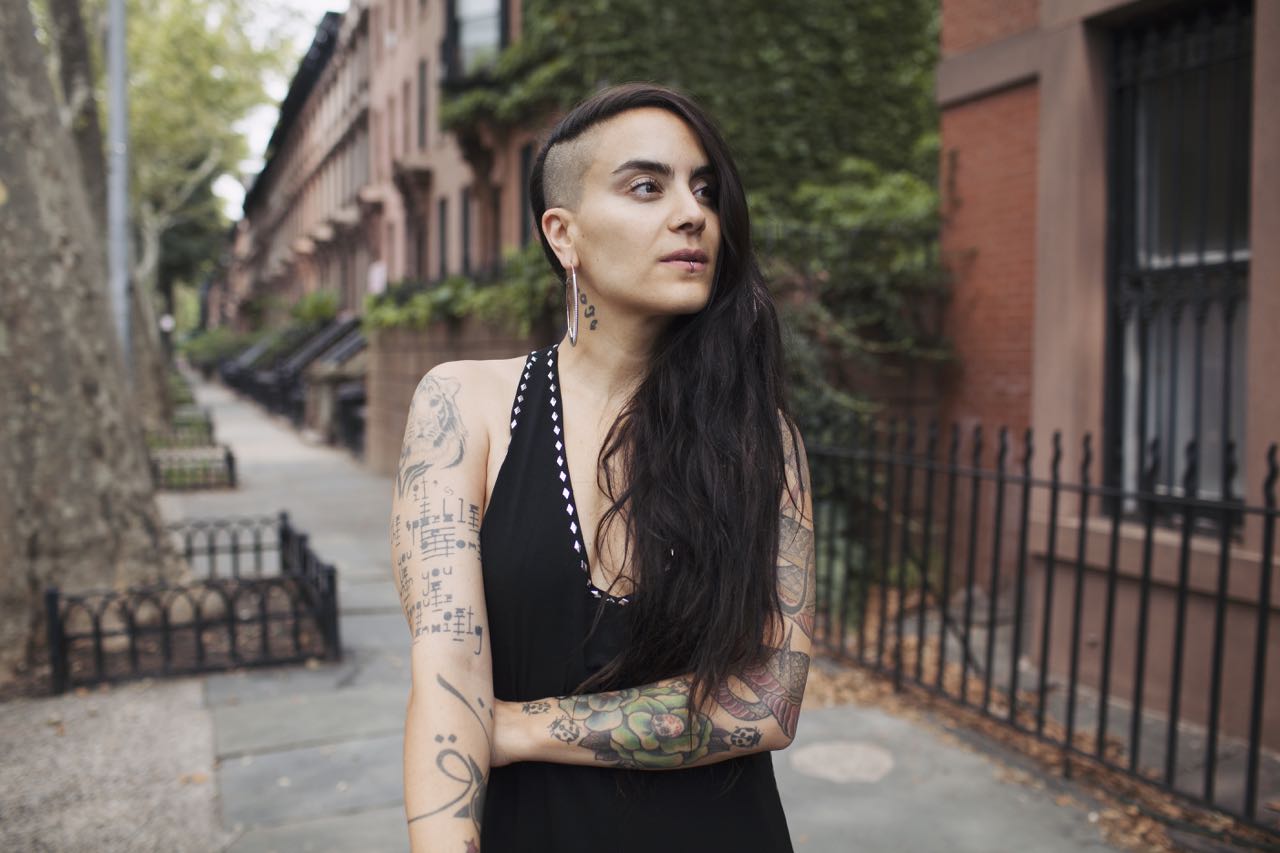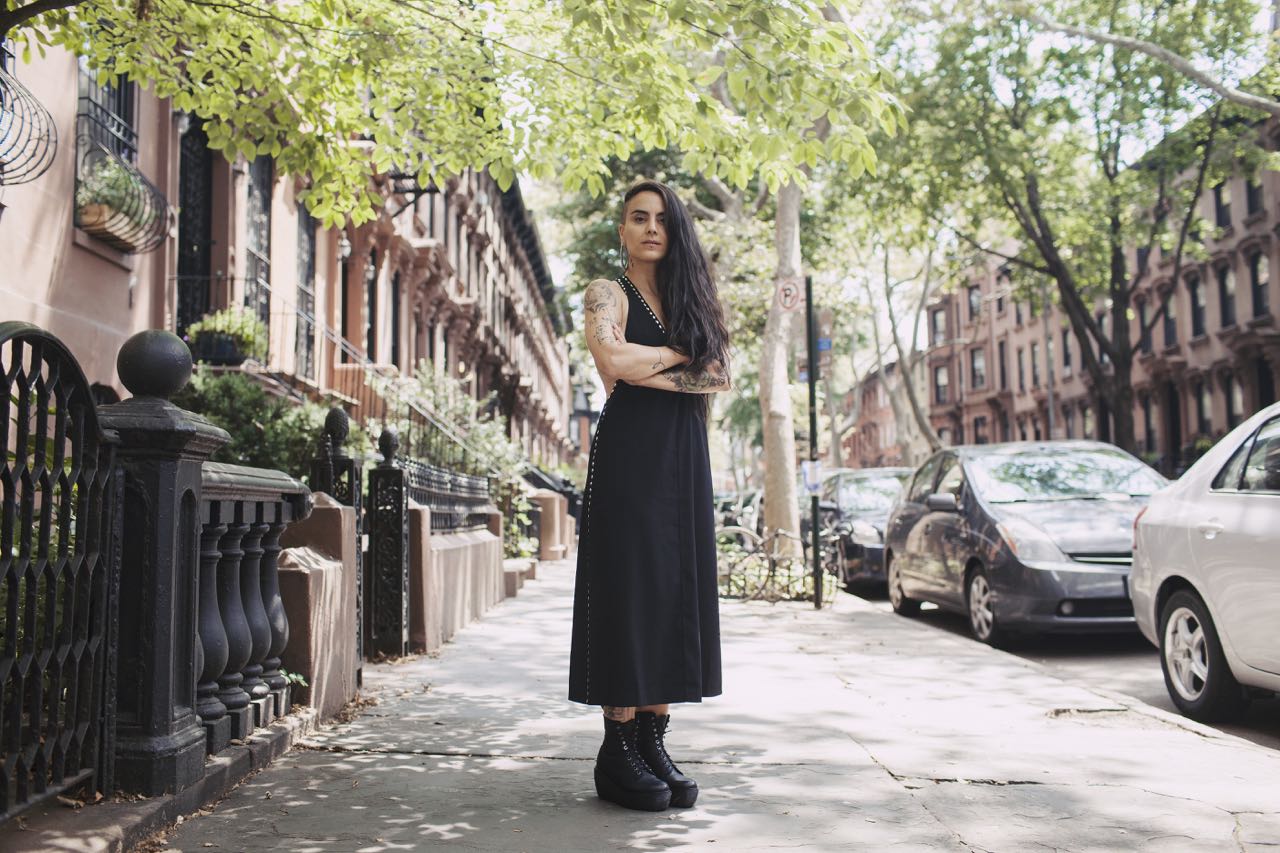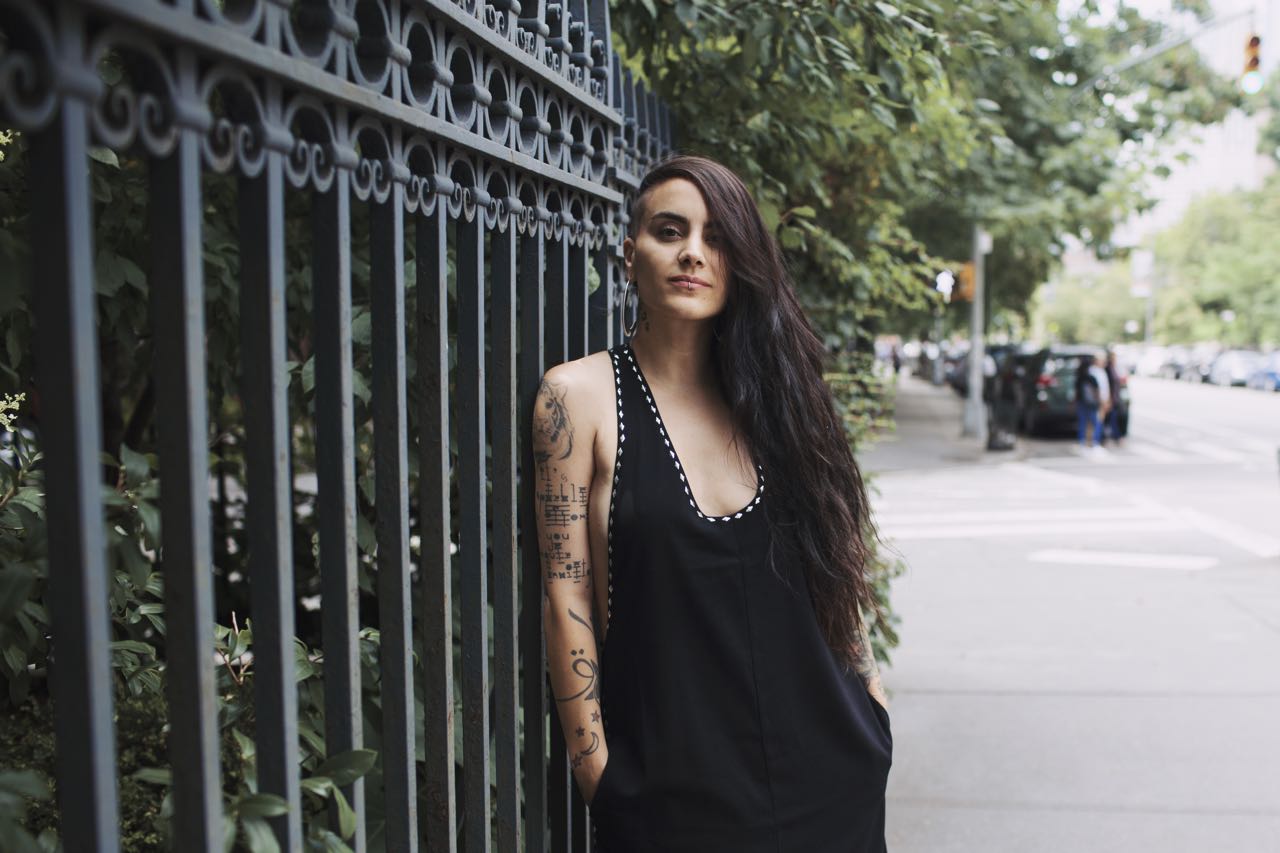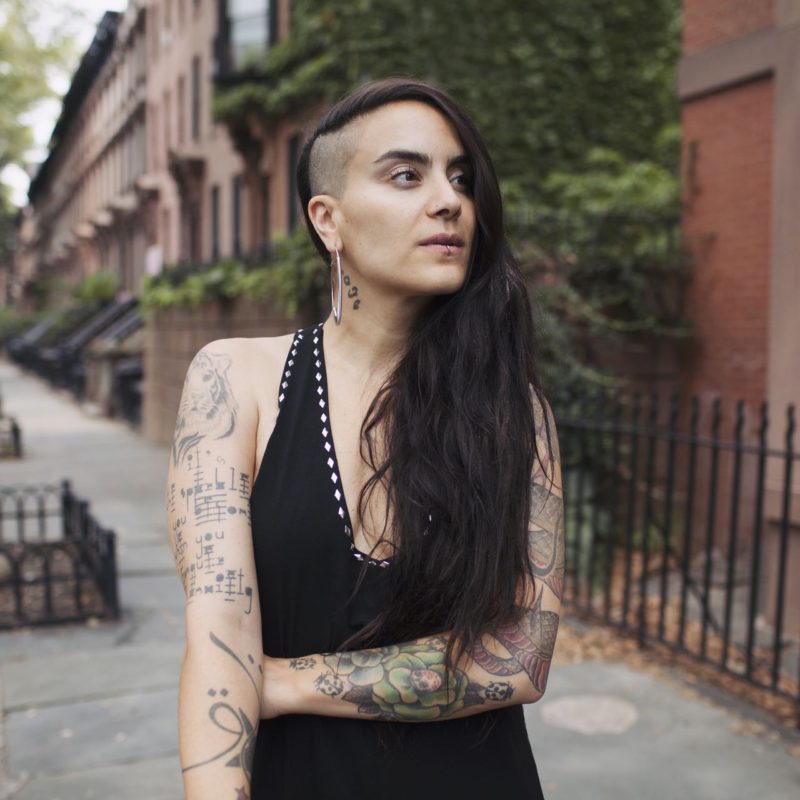Sonya Tayeh on “you’ll still call me by name”

Written by Victoria Myers
Photography by Jacqueline Harriet
August 9th, 2016
A little over a year ago The Interval got to talk to choreographer Sonya Tayeh, along with director Leigh Silverman, about re-inventing The Wild Party for City Center’s Encores! Off-Center. It was a conversation that I tried to drag out past the allotted time for many reasons, one of which was how fascinating it was to hear Sonya talk about her process and its many layers of creativity and intellect. As someone who has the coordination of a corgi and who generally enjoys sitting, she made me think about dance in a way I never had before. So, needless to say, we’re pretty excited about her upcoming New York Live Arts’ commission you’ll still call me by name. We recently chatted with Sonya in Brooklyn about what inspired the piece, translating things physically, and the challenges of fundraising.
Let’s talk about you’ll still call me by name. It’s about mothers and daughters, yes?
Yeah, it’s about family. You follow these two women as symbols of mother and daughter based on my experience, but I think this intention connects to any type of family barrier or conflict. It’s about the desire and the need for acceptance and mutual respect in your family and the barriers that come about and the chasms that are created when you don’t have that full acceptance.
What inspired you to create the piece?
Personal experience that I have in my family and how heartbreaking it is. This is what I talk about with my students. I teach kids and teenagers. Usually I’ll have these conversations with my students about wanting to have this acceptance in their family, and me saying this at 40 [still] feels jarring. It brought me back to the earth, knowing and understanding and embracing that acceptance. I keep using these words because that’s what really drives me, and respect and honor are ageless acts, in all forms of life. You follow these two forms [in the show], but I really feel like it’s a universal idea. I hope a lot of people that have these experiences or the desire for this respect come and see it.
They’re universal themes that everybody connects to.
Yeah. There’s no beginning, middle, end. My collaborators and I like to call it a moving diary or a live diary, because a lot of it comes from recordings of conversations and journal entries. I’m very present in the piece because it’s happening right now. It’s very current. It’s very real. Any time a different situation happens, it’s just fuel and inspiration to try to figure out what happens when this non-acceptance occurs, and how do you find the root of who you were? How do you find solace in this new reality in your family?
Could you talk more about your process of putting it together? Using journal entries and the recording of conversations sounds really interesting and surprising.
My collaborators—the Bengsons and Joanna Lampert, who is my girlfriend—and I love working together. About a year and a half ago, we just decided to record our conversations about our families, and realized these similar topics kept coming up about family and ritual and religion and spirituality and chasms and boundaries and all of these things. Then from there, the Bengsons presented these two musical tracks based on our conversation. They put parts of the recordings that inspired them into the songs. Hearing my voice and hearing what I was saying about my story that I feel is heartbreaking was so profound to me, where I said, “Yes, this is how it needs to be done.” This is not a linear story, a literal story. It’s an observation. How do we create, how do we physicalize this type of observation? Then from there, being inspired by those tracks, I would have situations that occurred, conflicts that occurred, and immediately record how I felt after, or write down what happened. Joanna would transcribe them, send them to the Bengsons, and then a song would come. It was just, that’s how the piece is going to evolve. It’s beautiful because it keeps me so present in this space because I’m hearing myself or I’m hearing them speak words that came from me or words that are inspired from my words to them. I pride myself on being present in this space when I’m working. I pride myself on an honest intention. I’ve never been so present in my life, because it’s all happening at the time it’s happening. It’s amazing.

When you’re doing a project that has an autobiographical element to it, does that change the way you approach it?
Yeah, because I don’t think there’s any room to work around it when I’m scared. I’m hearing what happened to me with this person, or how I felt when this happened. It’s a heightened state, and I’m presenting my most personal times to my dancers, too. “This is what I wrote because this tragic thing happened. Here, read it.” As opposed to just getting them on their feet and doing movement, there is truly a physicalized expression based on what was said, just like musicals and plays. I feel like because I’ve been immersed in that, this is very attractive to me because it heightens the physicality and makes it, to me, super, super, super real, where I have allowance not to maintain a literal idea. It just gives allowance for extraction and repetition, because this story, as it seems at this moment for me, is a hamster wheel. I’m thriving and struggling and desperate for this unconditional love and this unconditional respect that I’m not getting. It feels like a hamster wheel, which then inspires a lot of repetition going back to things. It feels like a love letter. It feels like a desperate plea. It’s a lot of heavy words that can get you really amped up.
How do you translate that physically?
Well, it’s totally challenging, but it’s exciting. Because this is happening in my life, it’s somehow forced me to have nostalgia about what once was. I find myself going back to those places of ritual, of my culture, of where I’m from. It’s making me go back and want to hyper-dissect them and remember them, because they feel lost right now. My family taught me discipline and ritual. How do you physicalize how I used to do something? In terms of discipline, it requires repetition. Ritual requires repetition. Gesture-ly, I could tonally change this one gesture with my arm in so many different ways. Because it’s a hamster wheel, I can do it in the beginning in the first five minutes, and then bring it back 60 minutes later, which is really inspiring. Then, to me, it is a symbol of a lack of a solution at this point, and also a remembrance of discipline and what I was taught. Do it over and over and over and over again, and be diligent on your approach, because if you do that, you’ll get answers. That’s why I’m doing it. I learned how to be disciplined and I learned ritual in my culture and traditions so much.
How did that manifest itself when you were growing up?
There was no half-assing things in my family. There just wasn’t. My mother is unbelievable in her convictions, and that’s how she raised us. That’s just what we knew. If we were going to do something, we were going to do it wholeheartedly and at 110 percent. If we weren’t, we stopped doing it. You speak your mind. If you want to do something, if you have a dream, if you will, you dissect it, obsess about it, study it, and be really, really amazing at it. I always say I refuse to be refused. I refuse to be questioned in a way where it prevents me from being my fullest self, so I just do the work, so that I know that I have no regrets. I think that was the through line of it, is if you do these things and if it doesn’t work out, at least you know you worked your ass off trying.
I’m really intrigued about how you keep saying it’s present tense and evolving, because something that I ask writers a lot is how when they’re working something over a long period of time, whether they just freeze it in time or whether they’re like, “Okay, I’m now working on this a year later and I’m different, so I’m going to bring that to the project.”
Because it’s so highly emotional, I wouldn’t be able to feed into it if it wasn’t happening at this moment. It’s definitely hard because it can sometimes feel insular, like I’m hidden in this experience or I have to make it a point to open myself up and not be so affected by it, but that’s the beauty of a commission, too. Having it for a year now, what I did last December at the showing was amazing in a sense of how it showed me all the things I was afraid of that I didn’t do. I was able to toss all of that away and dig inside of it more. [In December] I was a little bit more literal and a bit more sensible. Then I realized that that’s not going to get me anywhere, and that I need to dig in deeper and understand that this is my story, and an important one, especially for what’s happening in the world. It’s important to me. It took seeing it in a really surfaced fashion for me to then just expose all the nerves.
Does the fact that it’s autobiographical affect how you talk about it in the rehearsal room?
When I’m doing a gesture, I would say, “This reminds me of when this happened.” Then I’d just move forward. I try not to hold onto it so much. We understand that that’s the layer, the first layer of the experience, but I try to open it up. When I feel like it starts turning mechanical in terms of, “this is the dance move,” is when I really get inside of the autobiographical portion of it. Just to make sure that they get a visual, because I always say to my dancers, “Think first, visualize, and then apply.” We talk a lot prior to moving. I want to dig inside of this situation today. I hope they would say it’s a fun roller coaster ride of many different forms.
You mentioned religion playing a part in the piece, as well?
I think just the repetition of what I learned coming from a beautiful religious family, the traditions and culture that brings. It really is a discipline. I learned regimen, I learned preparation. I learned about having out of body experiences. I learned about patience, about understanding and forgiveness. A lot of that comes from that.
I sometimes ask people if they have a spiritual life and if it affects their work.
Spirituality is inside of my body. It’s totally inside of my work. Musically, too. Then that’s what’s so beautiful about the Bengsons as well. It’s a complete spiritual experience; the repetition in their music, the way Abigail and Joanna and Shaun sing, it really is a beautiful prayer. Truly. It’s amazing. For me, as I get older, I’m realizing that I trust my cells, meaning I trust goosebumps. I trust when my hands shake or when I am having something that’s happening in my stomach. I’m a physical person. I’m a dance maker, so those are things I connect with, in that they have meaning. When I talk about where I’m from and who I am and I talk about spirituality, that’s what it does to me. I know that there is truth there.

Let’s talk a little bit about the practical “putting it together” aspect. You have a commission, but that doesn’t actually mean that you have full funding.
Right. Exactly. The beauty about a New York Live Arts commission is that it’s a New York Live Arts commission. That’s incredible. They give you a certain amount of allotted studio hours to rehearse in and then a beautiful theatre. [They give you] press, beautiful programs, and a small but mighty portion of money. You have to raise the rest. I promised myself, when I received the commission, which was such an honor, that I wasn’t going to do it if I couldn’t have who I wanted. I promised myself that somehow, in my prayers, in my meditative state, I would conjure up this money. We started a Kickstarter. We have ten days [as of August 5th] left to raise $40,000. We raised over $32,000 so far. I’m sweating more as I talk about it, and that’s just a portion. I’ve been saving, and I’ve been saving for a long time. I’m a good saver. I’ve been waiting for the moment that I needed to use it, and this is the moment, because I want to pay everyone. Everyone in this team has been so invested—most of them are women, which is amazing—that I didn’t want to just pay them [the minimum of] what I could pay them. That’s the goal. It is so difficult because you have to talk about yourself, talk about the piece before you’ve even made a move. The vocabulary, the dialogue, the words are changing constantly, which is hard. It’s really, really difficult to raise the money, but like I said, with conviction and discipline and repetition, checking it over and over, sending mass emails, calling everyone, we’re going to get there.
You basically have to turn yourself into a businesswoman to do it.
Oh, I’m literally like a pantsuit, everything. You have to. You have to be demanding of, “This is what we need,” and not apologetic about what we need. We truly need this money. It’s no joke. This is a smaller show, but it’s a big cast. It’s about 14 people. That’s big. I am not doing a month of rehearsal. I’ve been working on it for a year, here and there, any time I have retreats or anything, but I’m starting in September and I go until we open in December. That’s a lot of people to pay. I’m contracting them for four months.
I think talking about money always makes people uncomfortable, but at the same time, that’s how things get done.
Totally. Exactly. It’s just setting the standard. It’s just saying, “This is the type of show. This is what it looks like. How are we going to make it happen?” Truly having faith. I truly believe in faith and talking to my collaborators and saying, “If money is a tricky conversation, just email me your fee without any prefacing prior. Just tell me your fee.” Without having them explain why it is their fee, I just want them to tell me what their fee is.
I think in the arts, there’s such an ambivalence about money to begin with. Much more than other areas. Because everybody wants things to be cheaper, but at the same time, you need to be able to finance things and pay people so they can make a living.
Like to eat. It’s a case of dancers, too. We are used to doing things for free. All of us in the arts. We’ll do things for free. We’ll work a crazy amount of hours a week. I’m down for that. I’m not getting paid for this. I’m getting fed in a different way definitely, and I don’t care. It’s not about that at all, but for my team that are investing so much, it means the world to me to support them and honor them for what they do.
To donate to the Kickstarter for “you’ll still call me by name,” click here.

